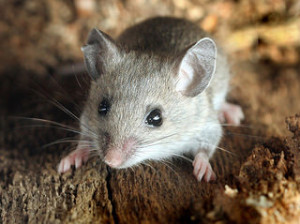What Do Mice in My Yard Have to Do With Lyme Disease?
By Chris Williams on July 29, 2015.
I heard something on a local radio station about keeping your yard free of mice to help reduce your chances of getting Lyme disease. I don’t get that, I thought Lyme disease was from ticks.
N. P., Londonderry, NH

Deer Mouse
Ticks are the vectors of Lyme disease which means that they are the agents that actually transmit the disease. When you are bitten by a blacklegged (=deer) tick that is infected with Lyme bacteria, those bacteria (mixed with the tick’s saliva) can then be injected into your bloodstream.
Mice Infect Ticks With Lyme Disease
Mice are part of the Lyme disease cycle because they are important hosts for the disease. You probably already know that deer are part of the Lyme disease cycle because deer are what adult blacklegged ticks usually feed on. However, the immature larval and nymphal ticks feed on birds or on smaller mammals like mice, rats, chipmunks, and voles. These smaller mammals act as “reservoirs” for the disease which means that they can carry the disease organisms in their bodies (usually with no symptoms) and can then pass them on to feeding ticks. An uninfected tick can pick up Lyme disease when feeding on an infected mouse. The disease multiplies in the tick’s body and can then be passed on to the next animal, or person, that it feeds on.
White-footed Mice Are the Main Hosts
White-footed mice or deer mice (both Peromyscus species) are the mice most often found outside, and can also be found inside homes (see Deer Mice – The Other Indoor Mice). These mice are the animals that most often serve as secondary hosts for blacklegged ticks. In some areas, more than 90% of the white-footed mice are infected with Lyme disease. Not only can these mice be infected with Lyme disease, but they can also be carrying infected ticks onto your property (and maybe into your home).
Eliminate Conditions That Attract Mice
So yes, it you live in an area with Lyme disease, you should do whatever you can to keep animals that could be carrying the disease or carrying infected ticks from visiting your yard. There are many things that you can do around your home such as removing debris piles, high weeds, heavy ground cover vegetation, and bird seed. Many of these measures will not only make your yard less habitable for rodents, but will also eliminate tick habitat (see Creating a Tick-Free Zone in Your Yard – Advice From the Pros).
If you have mice or other small mammals visiting or nesting on your property, give Colonial Pest a call. Our technicians can inspect your property for Lyme disease host animals and can set up a management plan that will help to keep mice and other animals out of your yard. We can also advise you on how to reduce tick encounters on your property.
Photo credit: USDAgov / Foter / CC BY